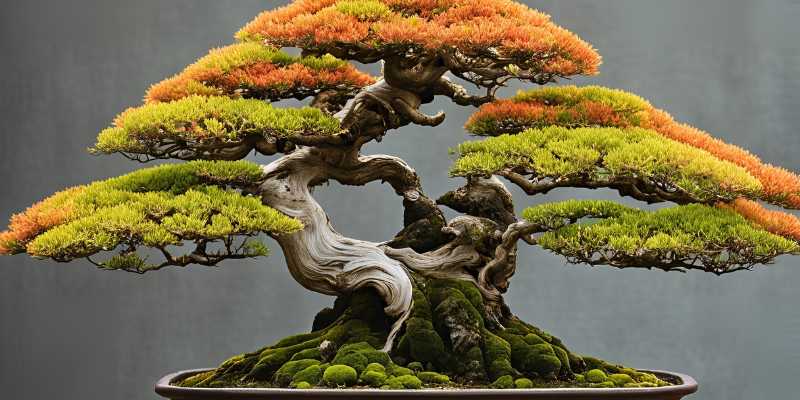Pruning a bonsai tree keeps it healthy and beautiful. But how do you do it right?
Pruning a bonsai tree is more than just cutting branches. It’s about shaping your tree, keeping it healthy, and encouraging growth. Understanding the best way to prune can make a big difference. Whether you’re new to bonsai or have some experience, pruning can seem tricky.
But don’t worry, it’s simpler than you think. By learning a few key techniques, you can master this art. In this guide, we’ll explore the best ways to prune your bonsai tree. You’ll learn tips and tricks to keep your tree in top shape. Ready to get started? Let’s dive in!
Introduction To Bonsai Pruning
Pruning a bonsai tree involves careful trimming to maintain its shape and health. Start by removing dead branches and trimming excess growth. Use sharp tools to make precise cuts and promote new growth.
What Is Bonsai?
Bonsai is the art of growing small trees. These trees look like full-sized trees but in miniature form. Many people enjoy this hobby. It brings peace and joy. Bonsai trees need care and attention. Regular pruning is essential.
Importance Of Pruning
Pruning helps shape the bonsai tree. It keeps the tree healthy. Pruning removes dead or unwanted branches. This allows new growth. It also improves the tree’s appearance. A well-pruned bonsai looks beautiful. Healthy growth is the key to a strong tree.

Credit: jpslifeandloves.com
Choosing The Right Tools
Selecting the right tools ensures precise cuts for your bonsai tree. Sharp shears and concave cutters are essential for clean pruning. Proper tools help maintain the tree’s health and beauty.
Essential Pruning Tools
Using the right tools is crucial for pruning bonsai trees. Sharp scissors are great for small branches. Pruning shears work well for thicker branches. Concave cutters help make clean cuts. Wire cutters are needed for shaping branches. Keep a small rake for cleaning soil. A watering can is also essential.
Tool Maintenance Tips
Clean tools after each use to avoid rust. Sharpen blades regularly. Store tools in a dry place. Oil the blades to keep them smooth. Check tools for damage often. Replace worn parts as needed. Keep tools organized for easy access. Proper care ensures tools last long.
Timing Your Pruning
Prune your bonsai tree during its growing season for best results. Trim back new growth to maintain shape and health.
Best Seasons For Pruning
Spring and early summer are the best times for pruning. Trees grow fast during these seasons. New shoots emerge. These shoots need trimming. Late summer and fall are also good. Trees slow down growth. Pruning then helps shape the tree. Winter is less ideal. Trees rest and heal slower.
Recognizing Growth Cycles
New growth appears as light green leaves. These leaves need careful pruning. Older growth is darker and thicker. Trim these leaves less often. Watch your bonsai. Learn its cycle. Prune during active growth. Avoid pruning during rest periods.

Credit: www.reddit.com
Basic Pruning Techniques
Pinching helps keep your bonsai small. Use your fingers to pinch off new shoots. This encourages the tree to grow more branches. Thinning is removing some leaves and branches. This lets more light and air in. Your bonsai will grow healthier this way. Pinch and thin during growing season. Always use clean tools. This prevents disease.
Wiring shapes your bonsai. Wrap wire around branches gently. Bend them to the desired shape. Check the wire regularly. Remove it before it cuts into the bark. Shaping is done by pruning and wiring. Patience is key. It takes time to shape a bonsai. Always wire young branches. They are easier to bend. Use the right wire size. Not too tight, not too loose.
Advanced Pruning Strategies
Leaf pruning helps control the size of your bonsai. Cut leaves during summer. This will encourage new growth. Use small, sharp scissors. Remove large leaves first. This makes the tree look better. Smaller leaves improve the tree’s appearance. New buds will grow in place of old leaves. This helps shape the bonsai.
Root pruning keeps the bonsai healthy. Cut roots every two years. Do this in spring. Use clean, sharp tools. Remove dead and long roots. This helps the bonsai stay small. New roots will grow from the cut areas. This makes the tree strong. Repot the bonsai after pruning. Use fresh soil for best results.

Credit: www.bonsaidirect.co.uk
Dealing With Common Issues
Pests can harm your bonsai. Aphids, spider mites, and scale insects are common. Check your tree often. Look for any signs of pests. Remove pests by hand if you see them. You can also use insecticidal soap. Spray it on the leaves. Be sure to cover both sides of the leaves. Repeat this every week until pests are gone. Clean the area around your bonsai. This helps keep pests away.
Diseases can weaken your bonsai. Fungal infections are common. Yellow or brown leaves are a bad sign. Remove any infected leaves. This stops the disease from spreading. Use a fungicide spray. Apply it to the entire tree. Follow the instructions on the label. Keep your bonsai in a well-ventilated area. Good air flow prevents disease. Avoid overwatering. Wet soil can cause root rot. Check the soil before watering. It should be slightly dry.
Maintaining Tree Health
Bonsai trees need the right amount of water. Too much water can cause root rot. Too little water can dry the tree out. Check the soil often. Keep it moist but not soggy. Use room temperature water. Water the tree in the morning. This helps the tree stay healthy.
Fertilize your bonsai tree to help it grow. Use a balanced fertilizer. Apply it every two weeks in spring and summer. In fall and winter, fertilize once a month. Follow the instructions on the fertilizer package. Do not over-fertilize. Too much can harm the tree.
Long-term Care
Bonsai trees need repotting every 2-3 years. This helps maintain healthy roots. Remove the tree from its pot. Trim the roots gently. Use a sharp, clean tool for this. Place fresh soil in the pot. Replant the tree carefully. Water it well after repotting. This helps it settle in.
Each season brings changes for bonsai care. In spring, new growth appears. Prune and shape the tree as needed. Summer brings strong sunlight. Ensure the tree gets enough water. Autumn is for preparing the tree for winter. Reduce watering. Winter care involves protecting the tree from frost. Move it to a sheltered spot. Each season needs special attention for healthy growth.
Expert Tips For Perfect Shape
Prune your bonsai tree regularly for a perfect shape. Trim branches and leaves to maintain its desired form. Use sharp tools for clean cuts.
Creating Balance
Pruning helps to create a balanced bonsai tree. Cut branches that grow too long. This makes the tree look even. Look for branches that cross or tangle. Remove them to keep things tidy. Balance is key. It helps the tree stay healthy and look nice. Regular pruning stops the tree from getting too crowded. This lets light reach all parts of the tree. With time, your tree will grow in a balanced way.
Enhancing Aesthetics
Pruning also enhances the tree’s beauty. Trim branches to shape the tree. This makes it look pretty. Keep the tree small and neat. This is important for bonsai. A well-shaped tree looks like a mini version of a big tree. This is the goal of bonsai. Prune leaves that are too big. This helps the tree look more in scale. Small, neat leaves look better. A beautiful bonsai is a joy to see.
Frequently Asked Questions
How Often Should I Prune My Bonsai Tree?
Prune your bonsai tree regularly, about every 4-6 weeks, to maintain its shape and health.
What Tools Do I Need For Bonsai Pruning?
You will need bonsai shears, concave cutters, and branch cutters for effective and precise pruning.
Can I Prune Bonsai Tree Roots?
Yes, root pruning is essential. Trim roots during repotting, which is usually done every 2-3 years.
When Is The Best Time To Prune Bonsai?
The best time to prune bonsai is in late winter or early spring, before new growth starts.
Conclusion
Pruning a bonsai tree can seem tricky at first. Start with small cuts. Focus on shaping and health. Remember to use clean tools. Regular pruning keeps your bonsai beautiful. Practice makes perfect. Enjoy the process. Your bonsai will thrive with care and attention.
Happy pruning!

My mission is to help you bring the beauty of nature indoors with expert advice, detailed plant care guides, and creative design ideas.



Leave a Reply